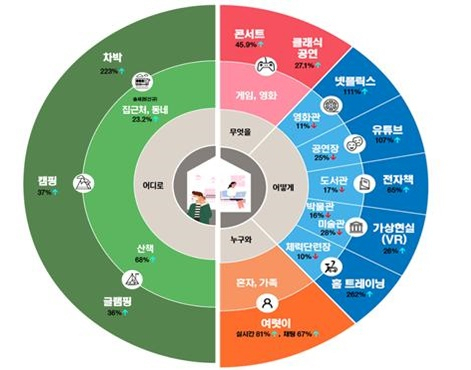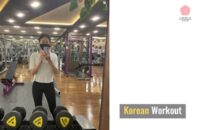
- Front row seats at home concerts (방구석 1열 콘서트) a hit
- Spread of Animal Crossing (동물의 숲) fever
- Rise of car camping (차박)
As the “stay home life” continues amid the pandemic, many Koreans are coping with corona blues by cooking and eating more without venturing outside. Online concerts viewed from the comfort of home are also providing everyone with free front row seats.
According to big data analysis by the Ministry of Culture, Sports and Tourism of about 14 million social media posts related to daily life for a year before and after the coronavirus outbreak in January (from July 2019 to August 2020), negative emotional keywords such as “depressed” and “annoyed” appeared frequently, while positive ones like “comfort” and “rest” were also common.
Related searches for positive emotional keywords were focused on “cooking or eating food”, “watching movies or YouTube”, and “going out for a stroll or driving”.
Cultural life in Korea was replaced with “watching something at home”, the frequency of which increased by 23.4% compared to the previous year. In particular, concerts showed the highest increase, followed by dramas, books, webtoons, classics, and games.
BTS was mentioned the most for concert related keywords, and pianist Seong-Jin Cho was the most popular for classic music. “Communication”, “YouTube”, “free” and “video” also appeared as main keywords, since Koreans were able to enjoy real-time online interactions with K-pop musicians and classic performances at home.
More Koreans watched dramas this year, and Netflix became the biggest winner among streaming services. Koreans also paid more attention to books, especially with moms and children reading together, online book cafes, e-books and audio books.
The game industry, which plays a big role in the South Korean economy, also experienced some major shifts. Online mentions of Animal Crossing (동물의 숲 or 동숲) increased by 2611%, compared to pre-COVID-19 numbers. Unlike more intense video games, such as Doom, the laid-back setting of this game appealed to Koreans for its ability to alleviate corona fatigue.
Regarding cultural content, “live”, “real-time” and “chat” increased by 168%, 81% and 67% respectively, showing rising interest in real-time human interaction.
The related searches for “near home or neighborhood” included “stroll”, “parks”, “convenience stores” and “dogs”, mainly “walking a dog at a part near home”. Comparing before and after COVID-19, the term “scooter”, or “kickboard” as they’re known in Korea, showed the highest increase in keyword mentions.
Travel trends have changed in Korea. “Car camping (차박)” keyword among related searches for “go somewhere” increased by 223%. References to hiking, camping and glamping also increased by 55%, 37% and 36% respectively. As a result, the prices of car camping spaces and related gear have spiked. Koreans are now preferring quiet travel destinations during COVID-19.
Korea has responded well to the COVID-19 pandemic after a quick spike in cases during the summer. This was largely thanks to the Health Insurance Review and Assessment Service (HIRA), which laid the groundwork for combating COVID-19 while containing Middle East Respiratory Syndrome (MERS) in 2015. Currently, Korea has implemented contact tracing, mandatory mask usage, high-testing rates, limits on social gatherings bolstered by overall trust in science and government institutions to keep the virus at a manageable level.
The Korean economy has also suffered one of the lowest downturns in the world during the pandemic.
How long these trends will continue remains to be seen.



